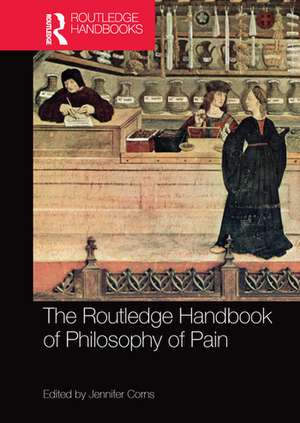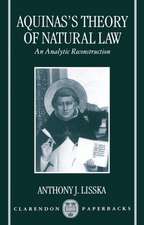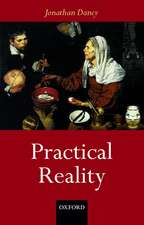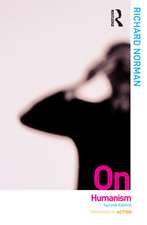The Routledge Handbook of Philosophy of Pain: Routledge Handbooks in Philosophy
Editat de Jennifer Cornsen Limba Engleză Paperback – 30 iun 2020
The Routledge Handbook of Philosophy of Pain is an outstanding reference source to the key topics, problems, and debates in this exciting and interdisciplinary subject and is the first collection of its kind. Comprising over thirty chapters by a team of international contributors the Handbook is divided into nine clear parts:
- Modeling pain in philosophy
- Modeling pain in neuroscience
- Modeling pain in psychology
- Pain in philosophy of mind
- Pain in epistemology
- Pain in philosophy of religion
- Pain in ethics
- Pain in medicine
- Pain in law
As well as fundamental topics in the philosophy of pain such as the nature, role, and value of pain, many other important topics are covered including the neurological pathways involved in pain processing; biopsychosocial and cognitive-behavioural models of pain; chronic pain; pain and non-human animals; pain and knowledge; controlled substances for pain; pain and placebo effects; and pain and physician-assisted suicide.
The Routledge Handbook of Philosophy of Pain is essential reading for students and researchers in philosophy of mind, philosophy of psychology and ethics. It will also be very useful to researchers of pain from any field, especially those in psychology, medicine, and health studies.
| Toate formatele și edițiile | Preț | Express |
|---|---|---|
| Paperback (1) | 450.02 lei 43-57 zile | |
| Taylor & Francis – 30 iun 2020 | 450.02 lei 43-57 zile | |
| Hardback (1) | 1225.52 lei 43-57 zile | |
| Taylor & Francis – 28 iun 2017 | 1225.52 lei 43-57 zile |
Din seria Routledge Handbooks in Philosophy
-
 Preț: 347.69 lei
Preț: 347.69 lei -
 Preț: 346.82 lei
Preț: 346.82 lei -
 Preț: 341.55 lei
Preț: 341.55 lei -
 Preț: 366.85 lei
Preț: 366.85 lei -
 Preț: 344.01 lei
Preț: 344.01 lei - 9%
 Preț: 1487.37 lei
Preț: 1487.37 lei -
 Preț: 341.55 lei
Preț: 341.55 lei -
 Preț: 349.50 lei
Preț: 349.50 lei -
 Preț: 404.99 lei
Preț: 404.99 lei -
 Preț: 346.44 lei
Preț: 346.44 lei -
 Preț: 359.03 lei
Preț: 359.03 lei -
 Preț: 359.28 lei
Preț: 359.28 lei -
 Preț: 366.16 lei
Preț: 366.16 lei -
 Preț: 349.21 lei
Preț: 349.21 lei -
 Preț: 438.66 lei
Preț: 438.66 lei -
 Preț: 345.63 lei
Preț: 345.63 lei -
 Preț: 343.72 lei
Preț: 343.72 lei -
 Preț: 346.27 lei
Preț: 346.27 lei - 9%
 Preț: 1489.80 lei
Preț: 1489.80 lei -
 Preț: 330.04 lei
Preț: 330.04 lei -
 Preț: 356.69 lei
Preț: 356.69 lei -
 Preț: 406.42 lei
Preț: 406.42 lei -
 Preț: 346.58 lei
Preț: 346.58 lei -
 Preț: 342.95 lei
Preț: 342.95 lei - 26%
 Preț: 1215.69 lei
Preț: 1215.69 lei - 30%
 Preț: 1218.56 lei
Preț: 1218.56 lei - 25%
 Preț: 1247.58 lei
Preț: 1247.58 lei - 25%
 Preț: 1222.75 lei
Preț: 1222.75 lei - 25%
 Preț: 1221.79 lei
Preț: 1221.79 lei - 18%
 Preț: 1562.46 lei
Preț: 1562.46 lei - 18%
 Preț: 1547.51 lei
Preț: 1547.51 lei - 25%
 Preț: 1220.12 lei
Preț: 1220.12 lei - 29%
 Preț: 1245.05 lei
Preț: 1245.05 lei - 18%
 Preț: 1567.41 lei
Preț: 1567.41 lei - 25%
 Preț: 1190.31 lei
Preț: 1190.31 lei - 18%
 Preț: 1571.78 lei
Preț: 1571.78 lei - 25%
 Preț: 1225.52 lei
Preț: 1225.52 lei - 25%
 Preț: 1196.43 lei
Preț: 1196.43 lei - 25%
 Preț: 1221.19 lei
Preț: 1221.19 lei - 18%
 Preț: 1565.35 lei
Preț: 1565.35 lei
Preț: 450.02 lei
Nou
Puncte Express: 675
Preț estimativ în valută:
86.11€ • 90.15$ • 71.25£
86.11€ • 90.15$ • 71.25£
Carte tipărită la comandă
Livrare economică 07-21 aprilie
Preluare comenzi: 021 569.72.76
Specificații
ISBN-13: 9780367573423
ISBN-10: 0367573423
Pagini: 476
Dimensiuni: 174 x 246 x 23 mm
Greutate: 0.78 kg
Ediția:1
Editura: Taylor & Francis
Colecția Routledge
Seria Routledge Handbooks in Philosophy
Locul publicării:Oxford, United Kingdom
ISBN-10: 0367573423
Pagini: 476
Dimensiuni: 174 x 246 x 23 mm
Greutate: 0.78 kg
Ediția:1
Editura: Taylor & Francis
Colecția Routledge
Seria Routledge Handbooks in Philosophy
Locul publicării:Oxford, United Kingdom
Public țintă
Postgraduate, Professional, and UndergraduateNotă biografică
Jennifer Corns is Lecturer in Philosophy at the University of Glasgow, UK. Her published research focuses on pain and affect. She aims to use philosophical tools and evaluate empirical research to make progress on topics that matter within and beyond the academy. She is currently revising a monograph, Pain is Not a Natural Kind.
Recenzii
"This is a marvellous resource for researchers and graduate students working on pain. The editor has done a magisterial job in bringing philosophy, neuroscience, and psychology into discussion and demonstrating how these approaches in turn interface with key areas of philosophy and of practice (law, medicine, ethics). It is an exemplary template for interdisciplinary research." - Matthew Broome, University of Oxford, UK
"This Handbook demonstrates how far the study of pain has developed in recent years. It presents an excellent overview of advances and current controversies about the nature of pain, in philosophy, neuroscience, and psychology, followed by chapters that exemplify pain’s relevance for both theoretical and practical inquiries. It will be invaluable for researchers and students in these different disciplines." - Barry Maund, The University of Western Australia
"This collection of philosophical essays from interdisciplinary experts confirms that the revolution in pain science and medicine has finally reached philosophy. The era of pain as a paradigm simply of sensation is ending. In these chapters, we see the emerging contours of an accelerating renaissance in philosophical thinking about pain." - Adam Swenson, California State University, Northridge, USA
"This is a marvellous resource for researchers and graduate students working on pain. The editor has done a magisterial job in bringing philosophy, neuroscience, and psychology into discussion and demonstrating how these approaches in turn interface with key areas of philosophy and of practice (law, medicine, ethics). It is an exemplary template for interdisciplinary research." - Matthew Broome, University of Oxford, UK
"This Handbook demonstrates how far the study of pain has developed in recent years. It presents an excellent overview of advances and current controversies about the nature of pain, in philosophy, neuroscience, and psychology, followed by chapters that exemplify pain’s relevance for both theoretical and practical inquiries. It will be invaluable for researchers and students in these different disciplines." - Barry Maund, The University of Western Australia
"This collection of philosophical essays from interdisciplinary experts confirms that the revolution in pain science and medicine has finally reached philosophy. The era of pain as a paradigm simply of sensation is ending. In these chapters, we see the emerging contours of an accelerating renaissance in philosophical thinking about pain." - Adam Swenson, California State University, Northridge, USA
"This collection presents a broad overview on the discourse on pain, and reveals how philosophy, particularly through analytic accounts, can bring clarity to the ambiguous experience. Clearly introduced and meticulously laid out, the Routledge Handbook provides an essential roadmap to philosophy's multidisciplinary engagements with pain." - Anna Westin, PhD, Lecturer in Ethics, London School of Theology
"This Handbook demonstrates how far the study of pain has developed in recent years. It presents an excellent overview of advances and current controversies about the nature of pain, in philosophy, neuroscience, and psychology, followed by chapters that exemplify pain’s relevance for both theoretical and practical inquiries. It will be invaluable for researchers and students in these different disciplines." - Barry Maund, The University of Western Australia
"This collection of philosophical essays from interdisciplinary experts confirms that the revolution in pain science and medicine has finally reached philosophy. The era of pain as a paradigm simply of sensation is ending. In these chapters, we see the emerging contours of an accelerating renaissance in philosophical thinking about pain." - Adam Swenson, California State University, Northridge, USA
"This is a marvellous resource for researchers and graduate students working on pain. The editor has done a magisterial job in bringing philosophy, neuroscience, and psychology into discussion and demonstrating how these approaches in turn interface with key areas of philosophy and of practice (law, medicine, ethics). It is an exemplary template for interdisciplinary research." - Matthew Broome, University of Oxford, UK
"This Handbook demonstrates how far the study of pain has developed in recent years. It presents an excellent overview of advances and current controversies about the nature of pain, in philosophy, neuroscience, and psychology, followed by chapters that exemplify pain’s relevance for both theoretical and practical inquiries. It will be invaluable for researchers and students in these different disciplines." - Barry Maund, The University of Western Australia
"This collection of philosophical essays from interdisciplinary experts confirms that the revolution in pain science and medicine has finally reached philosophy. The era of pain as a paradigm simply of sensation is ending. In these chapters, we see the emerging contours of an accelerating renaissance in philosophical thinking about pain." - Adam Swenson, California State University, Northridge, USA
"This collection presents a broad overview on the discourse on pain, and reveals how philosophy, particularly through analytic accounts, can bring clarity to the ambiguous experience. Clearly introduced and meticulously laid out, the Routledge Handbook provides an essential roadmap to philosophy's multidisciplinary engagements with pain." - Anna Westin, PhD, Lecturer in Ethics, London School of Theology
Descriere
An outstanding reference source to the key topics, problems and debates in this exciting and interdisciplinary subject and is the first collection of its kind. Essential reading for students and researchers in philosophy of mind, philosophy of psychology and ethics.
Cuprins
Introduction. Pain research: where we’ve been, where we’re going, and why it matters Jennifer Corns
1. A brief and potted overview on the philosophical theories of pain Valerie Hardcastle
2. Pain and representation Brian Cutter
3. An evaluative account of pain’s unpleasantness David Bain
4. Imperativism Colin Klein
5. Fault lines in familiar concepts of pain Christopher Hill
Part 2: Modeling Pain in Neuroscience
6. Advances in the neuroscience of pain Vania Apkarian
7. Neuromatrix theory of pain Mathieu Roy and Tor Wager
8. A neurobiological view of pain as a homeostatic emotion Irina A. Strigo and Arthur D. ("Bud") Craig
9. A view of pain based on sensations, meanings, and emotions Donald D. Price
10. Pathophysiological mechanisms of chronic pain Michael Thacker and Lorimer Moseley
Part 3: Modeling Pain in Psychology
11. Psychological models of pain Amanda Williams
12. Bisopsychosocial models of pain Thomas Hadjistavropoulos
13. Psychogenic pain: old and new Mark Sullivan
14. Pain, voluntary action, and the sense of agency Brianna Beck and Patrick Haggard
15. The lives of others: pain in non-human animals Paula Droege
16. Robot Pain Pete Mandik
17. Pain and consciousness David Pereplyotchik
18. Pain: perception or introspection? Murat Aydede
Part 5: Pain in epistemology
19. Pain and rationality Matthew Fulkerson and Jonathan Cohen
20. Pain and incorrigibility Peter Langland-Hassan
21. Can I see your pain? An evaluative model of pain perception Frederique De Vignemont
22. Pain and cognitive penetrability Hilla Jacobson
Part 6: Pain in philosophy of religion
23. Sacred pain: the use of self-inflicted pain in religion Ariel Glucklich
24. The role of pain and buddhism: the conquest of suffering Palden Gyal and Owen Flanagan
25. Pain and the divine Trent Dougherty
26. The problem of pain in the philosophy of religion Steve Layman
27. Bad by nature: an axiological theory of pain Olivier Massin
28. Pain and torture Michael Davis
29. Pain and education Avi I. Mintz
30. Pain and justified evaluative belief Robert Cowan
Part 8: Pain in medicine
31. An introduction to the IASP’s definition of pain Andrew Wright
32. Pain and ‘placebo’ analgesia Daniel Moerman
33. Pain management Carolyn Berryman, Mark Cately, and Lorimer Moseley
Part 9: Pain in Law
34. Pain and the law Ben A. Rich
35. Pain and controlled pain relieving substances Sunil Kumar Aggarwal and Katherine Pettus
36. Fetal pain and the law: abortion laws and their relationship to ideas about pain Stuart Derbyshire
37. Pain, mental suffering, and physician-assisted death Daniel Weinstock.
Index
Section 1: The Nature of Pain: what is Pain?Part 1: Modeling Pain in Philosophy
1. A brief and potted overview on the philosophical theories of pain Valerie Hardcastle
2. Pain and representation Brian Cutter
3. An evaluative account of pain’s unpleasantness David Bain
4. Imperativism Colin Klein
5. Fault lines in familiar concepts of pain Christopher Hill
Part 2: Modeling Pain in Neuroscience
6. Advances in the neuroscience of pain Vania Apkarian
7. Neuromatrix theory of pain Mathieu Roy and Tor Wager
8. A neurobiological view of pain as a homeostatic emotion Irina A. Strigo and Arthur D. ("Bud") Craig
9. A view of pain based on sensations, meanings, and emotions Donald D. Price
10. Pathophysiological mechanisms of chronic pain Michael Thacker and Lorimer Moseley
Part 3: Modeling Pain in Psychology
11. Psychological models of pain Amanda Williams
12. Bisopsychosocial models of pain Thomas Hadjistavropoulos
13. Psychogenic pain: old and new Mark Sullivan
14. Pain, voluntary action, and the sense of agency Brianna Beck and Patrick Haggard
Section 2: Theoretical implications: why does pain matter, theoretically?Part 4: Pain in philosophy of mind
15. The lives of others: pain in non-human animals Paula Droege
16. Robot Pain Pete Mandik
17. Pain and consciousness David Pereplyotchik
18. Pain: perception or introspection? Murat Aydede
Part 5: Pain in epistemology
19. Pain and rationality Matthew Fulkerson and Jonathan Cohen
20. Pain and incorrigibility Peter Langland-Hassan
21. Can I see your pain? An evaluative model of pain perception Frederique De Vignemont
22. Pain and cognitive penetrability Hilla Jacobson
Part 6: Pain in philosophy of religion
23. Sacred pain: the use of self-inflicted pain in religion Ariel Glucklich
24. The role of pain and buddhism: the conquest of suffering Palden Gyal and Owen Flanagan
25. Pain and the divine Trent Dougherty
26. The problem of pain in the philosophy of religion Steve Layman
Section 3: Practical implications: why does pain matter, practically?Part 7: Pain in ethics
27. Bad by nature: an axiological theory of pain Olivier Massin
28. Pain and torture Michael Davis
29. Pain and education Avi I. Mintz
30. Pain and justified evaluative belief Robert Cowan
Part 8: Pain in medicine
31. An introduction to the IASP’s definition of pain Andrew Wright
32. Pain and ‘placebo’ analgesia Daniel Moerman
33. Pain management Carolyn Berryman, Mark Cately, and Lorimer Moseley
Part 9: Pain in Law
34. Pain and the law Ben A. Rich
35. Pain and controlled pain relieving substances Sunil Kumar Aggarwal and Katherine Pettus
36. Fetal pain and the law: abortion laws and their relationship to ideas about pain Stuart Derbyshire
37. Pain, mental suffering, and physician-assisted death Daniel Weinstock.
Index


















